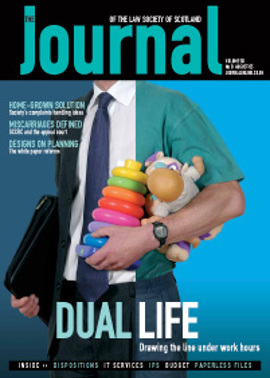IPS... keeping a watchful eye

Prior to the introduction of the concept of inadequate professional services by section 1 of the Solicitors (Scotland) Act 1988 (now sections 42A-42C of the Solicitors (Scotland) Act 1980), a dissatisfied client could have only two grounds of actionable complaint against a solicitor (ignoring for the purposes of this article any contractual obligations and liabilities). Either the solicitor had committed an act of misconduct or the solicitor had been negligent. If the allegation involved misconduct then a complaint was made to the Law Society of Scotland who would investigate the complaint, and if satisfied that it established a prima face case of misconduct, they would prosecute the solicitor before the Scottish Solicitors Discipline Tribunal. On the other hand, if the allegation was one of negligence then the client’s remedy lay in raising a civil action, with all the additional costs such a course of action would involve.
Many of the allegations of negligence, if successfully pursued, would involve an award of a relatively small amount of damages. In addition to this obvious deterrent to taking action, in many cases the client would have a more compelling interest in having unsatisfactory work completed satisfactorily rather than possibly receiving an award of damages some considerable time later.
Against this background, the concept of inadequate professional services was introduced. The intention was to allow a dissatisfied client to make an allegation of inadequate professional services to the Law Society of Scotland rather than being forced to seek redress through the civil courts. The Society would carry out an investigation at no expense to the complainer, and if the allegation was upheld, the Society had power inter alia to award compensation of up to £1,000 together with the power to order the solicitor to remedy the inadequate professional service (1980 Act, section 42A(2)).
This was a welcome addition to the remedies available so far as clients were concerned, and it must be said, should also have been welcomed by the profession as a means of avoiding protracted and public actions in the civil courts. The introduction of IPS remains a clear example of how the legal profession in Scotland remains at the forefront of public accountability in comparison with other professions. There are however some difficulties with the way the section has been introduced and interpreted and this short article will highlight some of these.
The problems with the section
Section 42A provides that if inadequate professional service is established, the Law Society of Scotland may make a determination or a direction in terms of the section. The situation can arise however where the client relations committee which has considered the complaint, takes the view that although inadequate professional service has been established, in all the circumstances of the case no determination or direction is necessary. A common example of how this may arise would be where the solicitor has tried to mediate with the client and perhaps has made some reduction in the level of fee, or has taken some other steps to remedy the inadequate service. Notwithstanding these actions, the client may at the end of the day still lodge a complaint with the Society. The Society has no alternative but to investigate the complaint in the normal way, and in due course the client relations committee dealing with the complaint may take the view that the service was inadequate, but that given the nature of the remedial steps already taken, no determination or direction is necessary.
HIDDEN SIGNIFICANCE
Whilst at first glance this may not seem of any particular significance, its significance for the solicitor is in fact profound. This is because of the terms of subsection (7) of section 42A, which states that a solicitor who is dissatisfied with a determination or a direction may appeal that decision to the Scottish Solicitors Discipline Tribunal. Accordingly the lack of a direction or determination means there is no ground of appeal available to the solicitor. The solicitor’s only remedy would lie in taking a judicial review, a much more costly and time-consuming course of action particularly when set against the typical award for a finding of inadequate professional service. There are also no provisions for an appeal by the client, but as discussed later, the client has a de facto avenue of appeal that is also unavailable to the solicitor.
It may be argued that a finding of inadequate professional service without any sanction attached should cause no concern to the solicitor involved. However, given that the Society keeps a record of findings of inadequate professional service, it is possible that a solicitor or firm having a number of such findings could in the future, if a more consumer-driven approach to complaints handling is introduced, face the possibility of a “totting up” approach from the Society, leading to a finding of unsatisfactory conduct or even potentially a prosecution for professional misconduct.
More importantly however, is a committee having the power to make a finding against which there is no appeal procedure available. Such a lacuna would appear to fly in the face of the current move towards complying at every level with the European Convention on Human Rights. It is also interesting to note at this point that whereas the client, if they are dissatisfied with the decision of the client relations committee, has a right of redress to the Legal Services Ombudsman, the solicitor is also denied this course of action. Whilst it was never intended that the Ombudsman act as a court of appeal in this way, in effect, given that no other appeal provisions exist, she is effectively driven to act in this way, often at the behest of clients who are simply unhappy with the finding of the client relations committee. Not only does this involve the solicitor in a further delay in finally concluding the issue, but it may ultimately result in the case being reopened and reinvestigated by the Society.
Another point of concern would be that a firm who apologised to a client and made some redress for some shortcoming in service could then face the problem described above, i.e. that a finding of inadequate professional services is made but with no determination or direction. This can only encourage firms not to be overly zealous in attempting to resolve alleged shortcomings of service.
INTEREST TO COMPLAIN
The final point of concern relates to who has an interest to complain. Section 42A(1)(a) of the 1980 Act provides that “any person having an interest” may complain. “Interest” is not defined, but the Society has already determined that beneficiaries and other third parties may have an interest to complain in terms of this section. The Legal Services Ombudsman is also keen to establish a more consumer-driven approach with third party complaints being much more widely available. Simply put, anyone who has been adversely affected by a solicitor’s actions could have an interest to complain. This dangerous approach is also reflected in the recent Executive discussion paper on complaints handling, and should be resisted by the profession as strenuously as possible. Whilst third party complaints do not give rise to compensation awards, they will, if they become more pervasive, simply cause further unnecessary concern to solicitors and place further stress on whatever complaints gateway we ultimately arrive at following the Executive consultation.
Compensation for IPS
From 1 April 2005, the limit for compensation has been increased to £5,000. This represents a fivefold increase on the previous level of compensation and such a figure could represent a significant financial burden to many firms, particularly if it is coupled with a requirement to repay or reduce fees or to carry out remedial work. This potentially dangerous situation is exacerbated when one bears in mind the ever increasing tendency of clients to complain and the fact that there is no limit to the number of service complaints a firm can suffer.
It is not yet clear whether such compensation awards would be covered under the professional indemnity insurance. However, even if they were to be, given the self-insured level that firms carry and the effect that any claim would have on the premium weighting, it is likely that many firms would choose not to have recourse to insurance. It is therefore even more imperative that solicitors have the right to appeal decisions in this area. Members of the Legal Defence Union, who are already entitled to advice and representation in connection with allegations of inadequate professional service, may also be covered for appeal against a finding of inadequate professional services depending on circumstances.
Seek a determination
To address fully the issues above would require legislation and this may be one of the areas that the current Executive consultation should consider. In the meantime one step which the Society could take to safeguard the solicitor’s right of appeal would be to instruct their client relations committees that in every case where an allegation of inadequate professional service is upheld, they must make a determination, even if that determination is to award zero compensation. This would then allow an appeal against that determination if required. To do otherwise would only encourage solicitors not to mediate with dissatisfied clients lest their apology and redress are later used against them as evidence, and such a course of action can be to neither party’s benefit.
Professor David O’Donnell is Chief Executive of the Legal Defence Union and Professor in Legal Ethics and Professional Practice, Aberdeen Business School, The Robert Gordon University
In this issue
- Prosecuting bigotry offences
- A hotter than average July
- Advice for all, but what about justice?
- Calling time
- The anti-avoidance drive
- The best option?
- Radical design
- Miscarriages of justice
- Information technology
- IPS... keeping a watchful eye
- When less means better
- Reality check - not Big Brother
- A clear duty
- Missing a generation
- Does age matter?
- Fair picture?
- Book debts: the final word?
- Website reviews
- Book reviews
- Challenging the sacred cows of conveyancing






